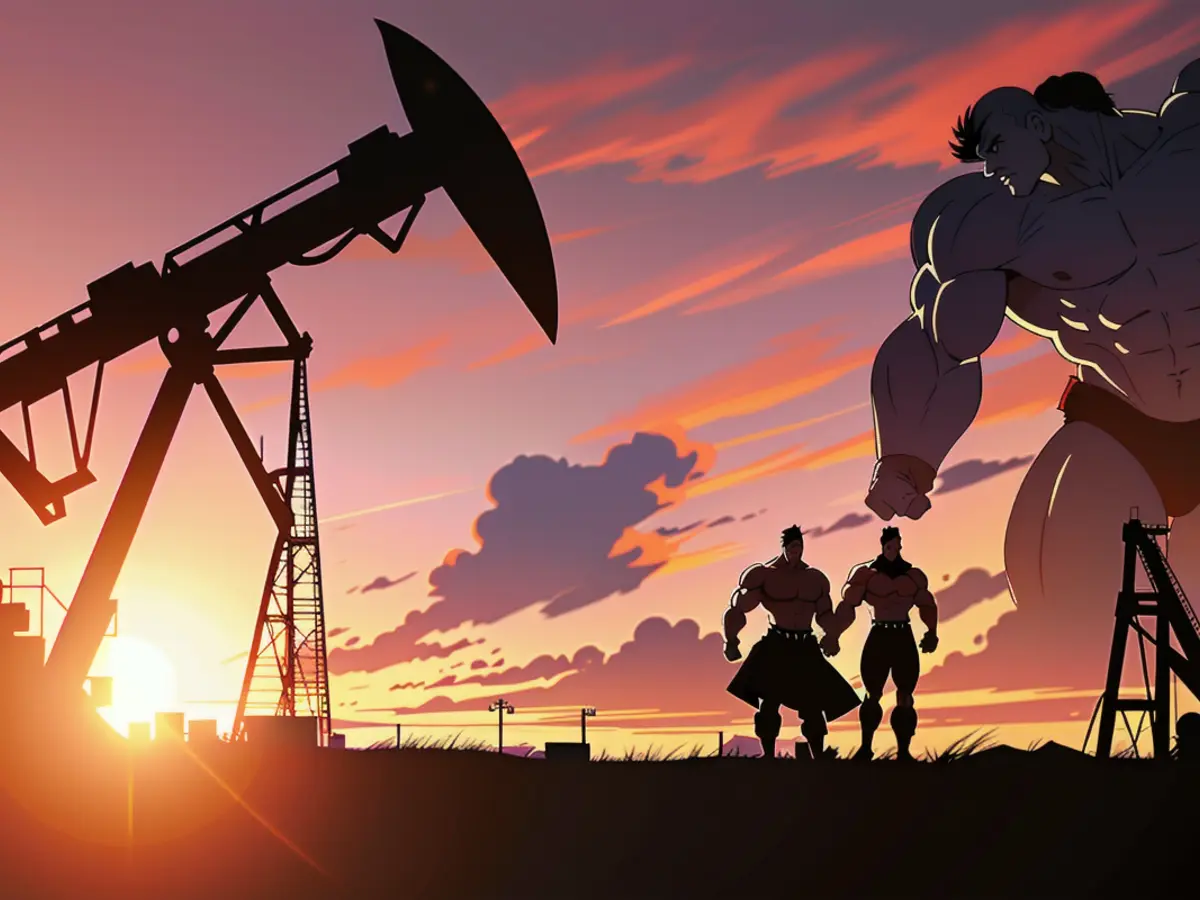The Media's Persistent Focus on the Oil and Gas Sector: What's Behind the Fascination?
The media's persistent fascination with the oil and gas sector stems from deep-rooted interests and shows no signs of waning. The new TV series, Landman, explores this fascination by delivering a gripping depiction of life in this field. Focusing on the high-pressure domain of landmen, who secure drilling rights for oil companies, the show highlights the exhilaration, peril, and corporate wars that characterize the industry.
Similar to numerous films and TV shows, Landman showcases the thrill of making or losing fortunes overnight. Dramatizing life-threatening situations on oil rigs and the cutthroat nature of corporate negotiations, the series draws attention to the industry's alluring blend of danger and profit.
However, it's essential to consider the authenticity of these portrayals and the reasons behind the media's obsession with this volatile, frequently murky oil landscape.
Oil has long symbolized wealth, power, and risk, making it a popular theme for storytelling. Series like Dallas and Blood and Oil have capitalized on this potential, zeroing in on oil tycoons, family dynasties, corporate warfare, and scandalous backstabs.
In Landman, the show captures this same high-drama cachet with intense action and suspense, incorporating tragic accidents and fiery conflicts. Despite appearing overly dramatic, these moments are essential to the series' appeal, macerating viewers with the thrill of unpredictability.
Co-creator Christian Wallace himself acknowledges that certain scenes, like the scene of a plane collision with an oil tanker, have been dramatically enhanced. While these scenes are undeniably entertaining, they project an image of an industry driven by constant danger and high-octane action.
Beyond its intense moments, the oil industry's true reality is more nuanced. While Landman does a commendable job of conveying the tension of working in such a high-risk sector, it fails to fully manifest the day-to-day grind of the business. Unbeknownst to many, oil work isn't solely about thrilling explosions or fierce corporate rivalries. It entails handling complex legal work, negotiating land deals, and navigating intricate regulations, just as crucial as the adrenaline-pumping events on oil rigs.
Landman sheds light on the dangers inherent in oil work, but it overlooks the backstage labor that fuels its operations. In actuality, the oil business isn't merely a realm of dramatic accidents or corporate wars. It encompasses managing environmental and safety regulations, obtaining permits, and handling intricate contracts — tasks that may lack entertainment value yet hold significant sway over the success or failure of oil ventures.
The striking contrast between the sensational on-screen portrayals and the actual industry has maintained its allure for the media. The oil sector has long been synonymous with wealth and political power, and the lure of striking it rich by discovering or drilling for oil continues to captivate.
Media depictions generally overlook the slow-moving, more methodical work that characterizes the majority of the sector, favoring portrayals of high-drama moments like sudden wealth or catastrophic failure. The genuine power of oil lies not only in the thrill of discovery, but in the calculated decisions taken in boardrooms and legal offices, where companies negotiate drilling rights, fight over land, and balance environmental and safety risks.
The oil industry is substantially more about navigating these bureaucratic obstacles than the high-stakes scenes of corporate sabotage or fiery disasters commonly showcased in films and TV shows.
Nonetheless, this romanticized portrayal keeps the oil sector so intriguing to the general public. The media is naturally drawn to the notion of significant, bold actions—explosions, plane crashes, corporate conflicts—and oil servings as an ample source of these stories. It taps into larger cultural narratives of wealth, power, and risk-taking, which have always been key aspects of the oil sector.
Even when a show like Landman showcases the less glamorous, off-screen aspects of the sector, it often maintains the tension or drama—such as the consistent threat of legal battles or corporate sabotage. The combination of high stakes and complex problem-solving makes oil a seemingly never-ending well of storytelling potential.
The relationship between the media and the oil sector is not merely about entertainment—it also shapes public perception. Films and TV shows have long facilitated the normalization of oil consumption, presenting it as an indispensable component of modern life and economic progress.
Whether it's a disaster film like Deepwater Horizon or a corporate drama like Landman, these portrayals contribute to reinforcing oil's role in molding the contemporary world, despite growing awareness of its environmental and societal repercussions. The media often balances this portrayal by highlighting the risks and dangers associated with oil, but the focus remains on the broader narrative: oil is a cornerstone of global influence, wealth, and technological advancement.
In essence, the oil and gas sector presents a mix of thrill, risk, and prosperity that keeps the media spellbound. Series like Landman will remain a part of the discussion, feeding into the public's fascination with oil, despite augmenting certain aspects of the sector for entertainment purposes.
For anyone actually engaged in the industry, the real story is far more intricate than what we see on screen. The authentic challenges of the oil domain encompass lengthy negotiations, careful planning, and ensuring compliance with the myriad of rules and regulations governing every facet of the business. While the drama of Landman may not mirror the daily reality of the oil sector, it serves as a reminder that, even in a world shaped by power and affluence, the risks and rewards of the oil game never fade from our collective memory.
My childhood connections to the oil industry were quite intimate. I spent countless hours tagging along with my great-grandfather in his truck, traversing the vast landscapes of West Texas to inspect oil wells. The wells, the land, and his no-nonsense approach to the work significantly influenced me.
These early experiences provided a far more comprehensive understanding of the industry than any media portrayal could offer. I learned that the true might of oil isn't derived from sensational explosions or corporate conflicts, but from the tranquil perseverance, the daily grind, and the thoughtful decision-making behind the scenes.
As I delved deeper into the industry myself, these lessons remained constant companions. While the work isn't always glamorous, whether it involves negotiating drilling rights or untangling land disputes, the unwavering determination, the long hours, and the painstaking attention to detail are the driving forces of the industry.
Shows like Landman may focus on the thrill, but it's the less glamorous, more analytical side of the business that has shaped my journey in oil and gas, and continues to keep me invested in it today.
The tv review of Landman reveals how the show highlights the petroleum industry's thrilling blend of danger and profit, using high-pressure scenarios to attract audiences. Despite its dramatic enhancements, the series accurately portrays the oil industry's allure, stemming from its historical association with wealth, power, and risk.
In contrast, the petroleum industry involves a wide range of less glamorous tasks, such as handling complex legal work, negotiating land deals, and complying with regulations. These essential yet often overlooked aspects of oil work play a significant role in the sector's overall success or failure.







